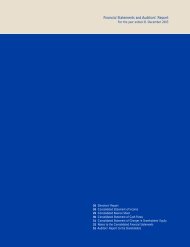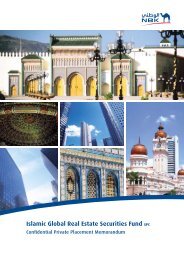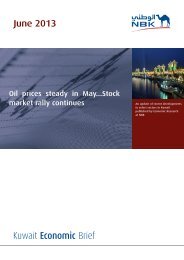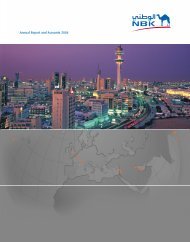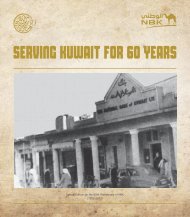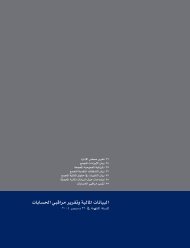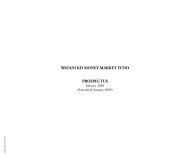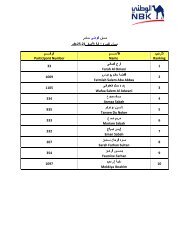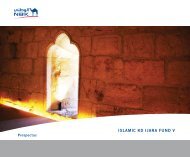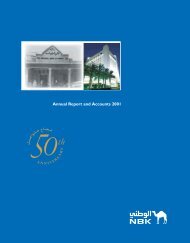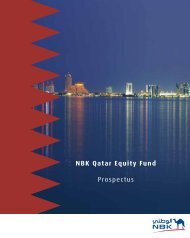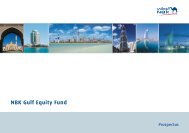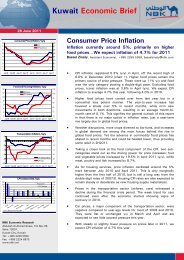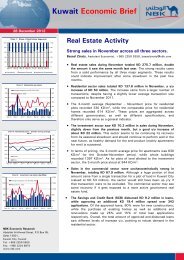Create successful ePaper yourself
Turn your PDF publications into a flip-book with our unique Google optimized e-Paper software.
GCC Brief<br />
<strong>18</strong> <strong>March</strong> <strong>2009</strong><br />
Stock market data:<br />
850<br />
800<br />
750<br />
700<br />
650<br />
600<br />
550<br />
500<br />
450<br />
400<br />
350<br />
300<br />
250<br />
GCC MSCI stock market index, 2008-<strong>2009</strong><br />
Jan Mar May Jul Sep Nov Jan Mar<br />
Oil market data:<br />
160<br />
140<br />
120<br />
100<br />
80<br />
60<br />
40<br />
20<br />
Crude oil prices, 2008-<strong>2009</strong>, $pb<br />
WTI<br />
OPEC<br />
Jan Mar May Jul Sep Nov Jan Mar<br />
850<br />
800<br />
750<br />
700<br />
650<br />
600<br />
550<br />
500<br />
450<br />
400<br />
350<br />
300<br />
250<br />
160<br />
140<br />
120<br />
100<br />
IEA <strong>2009</strong> forecasts (mbd):<br />
World oil dd = 84.4 (-1.5%)<br />
Non-OPEC supply = 50.6 (+0.0%)<br />
Latest GCC monetary data:<br />
(17 th <strong>March</strong> unless otherwise stated)<br />
Bahrain:<br />
<strong>Kuwait</strong>:<br />
M3 16.4 %y/y (Jan)<br />
Repo rate 2.75 %<br />
$1=BHD 0.377<br />
M2 14.0 %y/y (Jan)<br />
Disc. rate 3.75 %<br />
$1=KWD 0.294<br />
80<br />
60<br />
40<br />
20<br />
Commentary<br />
UAE economy: improvement in<br />
2H09 not guaranteed<br />
by Daniel Kaye, Senior Economist, +965 2259 5363<br />
danielk@nbk.com<br />
• Analysts’ forecasts for real growth in the UAE economy in <strong>2009</strong> have<br />
converged around the 0-2% range recently, factoring-in a recovery in<br />
economic performance in H2 09. But a meaningful improvement is by<br />
no means guaranteed.<br />
• Even if financial markets stabilize, a combination <strong>of</strong> subdued asset<br />
prices, a large debt overhang and rising risk aversion is likely to bear<br />
down on private sector activity for some time to come. Government<br />
spending is likely to be the only major source <strong>of</strong> support.<br />
• Accordingly, the risks surrounding the consensus view <strong>of</strong> economic<br />
growth this year remain stacked to the downside. We expect to<br />
downgrade our forecast for GDP over coming weeks.<br />
Charts<br />
Focus on…GCC banks’ assets<br />
Assets <strong>of</strong> GCC commercial banks, Jan 2004 - Dec 2008<br />
1,400<br />
40<br />
1,300 Level (LHS, $bn)<br />
35<br />
1,200 %y/y (RHS)<br />
1,100<br />
30<br />
1,000<br />
25<br />
900<br />
20<br />
800<br />
15<br />
700<br />
600<br />
10<br />
500<br />
5<br />
400<br />
0<br />
2004 2005 2006 2007 2008<br />
More>><br />
More>><br />
GCC banks’ balance<br />
sheets more or less<br />
stagnated towards the<br />
end <strong>of</strong> 2008 after a<br />
period <strong>of</strong> rapid<br />
expansion. Early data<br />
show significant<br />
deleveraging in some<br />
countries in <strong>2009</strong>.<br />
Oman:<br />
M2 20.7 %y/y (Jan)<br />
Repo rate 2.00 %<br />
$1=OMR 0.385<br />
N.B. Incorporates estimates for recent data for the UAE and Qatar.<br />
Source: ThomsonReuters Ecowin / national central banks<br />
Qatar:<br />
M3 35.8 %y/y (Oct)<br />
Lend. rate 5.50 %<br />
$1=QAR 3.642<br />
Data<br />
Financial and economic data<br />
More>><br />
Saudi<br />
Arabia:<br />
M3 13.9 %y/y (Jan)<br />
Repo rate 2.00 %<br />
$1=SAR 3.751<br />
UAE:<br />
M3 34.4 %y/y (Sep)<br />
Repo rate 1.00 %<br />
$1=AED 3.673<br />
NBK Economic Research<br />
Abdullah Al-Ahmed Street, P.O Box 95, Safat 13001,<br />
<strong>Kuwait</strong> City, <strong>Kuwait</strong><br />
Tel: +965 2259 5500 Fax: +965 2224 6973<br />
www.nbk.com
GCC Brief | <strong>18</strong> <strong>March</strong> <strong>2009</strong><br />
UAE economy: improvement in 2H09 not guaranteed<br />
The news flow emerging from the UAE economy<br />
points to continued weakness, but a consensus<br />
amongst analysts seems to have emerged that<br />
economic growth will be much reduced, though<br />
positive this year. Chart 1 shows that institutions’<br />
latest forecasts for real economic growth in <strong>2009</strong><br />
appear to have converged around the 0-2% level<br />
(including our own <strong>of</strong> 1%, made in December last<br />
year), well down on estimates for the past couple<br />
<strong>of</strong> years, but by no means a disaster compared to<br />
the deep falls in output expected in other parts <strong>of</strong><br />
the world. Indeed, much <strong>of</strong> this forecast ‘weakness’<br />
reflects a projected fall in oil output as a result <strong>of</strong><br />
big cuts in OPEC production quotas, so the<br />
performance <strong>of</strong> the non-oil economy is implicitly<br />
assumed to remain considerably more robust.<br />
12<br />
11<br />
10<br />
9<br />
8<br />
7<br />
6<br />
5<br />
4<br />
3<br />
2<br />
1<br />
0<br />
-1<br />
Chart 1: UAE real GDP, %y/y<br />
Source: ThomsonReuters Ecowin / NBK<br />
N.B. Uses NBK estimate for 2008<br />
Forecasts for <strong>2009</strong><br />
2006<br />
2007<br />
2008e<br />
Moody's<br />
EIU<br />
NBK<br />
HSBC<br />
StanCht<br />
Samba<br />
EFGH<br />
12<br />
11<br />
10<br />
9<br />
8<br />
7<br />
6<br />
5<br />
4<br />
3<br />
2<br />
1<br />
0<br />
-1<br />
Are such benign forecasts still realistic? Much <strong>of</strong><br />
this story is predicated on an improvement in<br />
economic conditions in the second half <strong>of</strong> this year,<br />
primarily as a result <strong>of</strong> two key factors: a return to<br />
‘normality’ in the country’s battered financial<br />
markets and the boost to activity delivered by a<br />
major government fiscal stimulus, a large chunk <strong>of</strong><br />
which has already been outlined by the Federal and<br />
Dubai governments. (See below.) Our view is that<br />
although both <strong>of</strong> these events may well occur, there<br />
is no guarantee that they will translate into a<br />
meaningful recovery in activity in the real economy,<br />
much less a return to the buoyant conditions <strong>of</strong> the<br />
recent past. Accordingly, expectations <strong>of</strong> even<br />
modest growth in the real economy this year may<br />
turn out to be disappointed.<br />
Stabilizing financial markets<br />
On the positive side, the UAE policy authorities<br />
have spent considerable effort over the past few<br />
months attempting to stabilize the banking and<br />
financial sectors – surely a precursor to reestablishing<br />
confidence amongst the Emirate’s<br />
businesses and consumers. That support has come<br />
in three forms. Firstly, they have attempted to ease<br />
the severe liquidity shortage in the banking system<br />
caused by a freezing <strong>of</strong> the interbank market and a<br />
dramatic outflow <strong>of</strong> funds from abroad. A variety <strong>of</strong><br />
measures have been used:<br />
i) The Central <strong>Bank</strong> <strong>of</strong> the UAE’s (CBUAE)<br />
benchmark repo rate has been cut from 2% to<br />
1% between September 2008 and January<br />
<strong>2009</strong>, after starting last year at 4.25%.<br />
ii) The introduction <strong>of</strong> a Liquidity Support Facility<br />
(LSF) from the CBUAE in September 2008 - a<br />
$14bn emergency lending facility to enable<br />
banks to cover their existing funding<br />
commitments.<br />
iii) The announcement by the Federal government<br />
in October that it would place $19bn <strong>of</strong> 2-<br />
year deposits at banks. Some $14bn <strong>of</strong> these<br />
funds are said to have been deposited so far.<br />
iv) The CBUAE’s introduction <strong>of</strong> a US dollar swap<br />
facility in December aimed at reducing dirham<br />
liquidity shortages. In January, it announced<br />
that it had provided banks with dirham funds<br />
worth around $1bn under the scheme.<br />
Secondly, local and federal governments have taken<br />
more direct action to shore-up confidence in the<br />
banking system and to guard against systemic<br />
failure. The federal government moved in October<br />
to guarantee deposits in all local banks and foreign<br />
banks with significant operations in the country,<br />
thereby reducing the chances <strong>of</strong> panic-induced bank<br />
runs. More recently, the government <strong>of</strong> Abu Dhabi<br />
injected some $4.4bn <strong>of</strong> capital into five local banks<br />
to protect against possible future loan defaults.<br />
Finally, steps have been taken to calm investor<br />
nerves surrounding default risk <strong>of</strong> governmentrelated<br />
institutions. In February, the Dubai<br />
government announced that the CBUAE would<br />
purchase $10bn <strong>of</strong> a proposed $20bn government<br />
bond program this year, with the funds expected to<br />
be partly used to help state-backed corporates rollover<br />
their maturing debt. It is thought that – if<br />
capital market conditions remain difficult – the<br />
2
GCC Brief | <strong>18</strong> <strong>March</strong> <strong>2009</strong><br />
central bank could subscribe to the second tranche<br />
<strong>of</strong> the issue later in the year.<br />
Helpful though these measures undoubtedly are,<br />
they are very far from setting the stage for a<br />
wholesale turnaround in financial conditions in 2H<br />
09. On a variety <strong>of</strong> measures, stress level indicators<br />
in the financial system remain elevated. For a start,<br />
despite liquidity injections and indications <strong>of</strong> statelevel<br />
support, the recovery in interbank lending<br />
markets remains tentative at best. As chart 2<br />
shows, although they have fallen significantly since<br />
the beginning <strong>of</strong> the year, interbank rates remain<br />
some 200 bps above the <strong>of</strong>ficial repo rate – whose<br />
levels they tracked quite closely before the crisis<br />
began. They also remain well above levels seen in<br />
other GCC countries: in Saudi Arabia, for example,<br />
the 3-month rate is now at just 1.1%, even though<br />
the <strong>of</strong>ficial lending rate is higher. Not only does this<br />
make the recycling <strong>of</strong> funds around the banking<br />
system more difficult, but it also highlights a<br />
continuing lack <strong>of</strong> confidence amongst some<br />
lending institutions in the country.<br />
6.0<br />
5.0<br />
4.0<br />
3.0<br />
2.0<br />
1.0<br />
0.0<br />
Chart 2: UAE interest rates, %<br />
1 month interbank<br />
3 month interbank<br />
Repo rate<br />
Jan-07 May-07 Sep-07 Jan-08 May-08 Sep-08 Jan-09<br />
Source: ThomsonReuters Ecowin<br />
Secondly, even if banks’ desire to expand their<br />
lending activities returns, it is unclear that they will<br />
be able to do so. The withdrawal <strong>of</strong> overseas<br />
funding has left local banks with a major funding<br />
gap, pushing them further in breach <strong>of</strong> the<br />
prescribed loan-to-deposit ratio (LDR) <strong>of</strong> 100%. Last<br />
week, CBUAE governor Sultan bin Nasser Al<br />
Suwaidi announced that the funding gap was some<br />
$30bn. One way out <strong>of</strong> this would be a temporary<br />
increase in the LDR. But more likely is an injection<br />
<strong>of</strong> cash by the federal government. Even this by<br />
itself may not be enough to stimulate lending if<br />
banks choose to hoard the extra deposits rather<br />
than lend them out.<br />
6.0<br />
5.0<br />
4.0<br />
3.0<br />
2.0<br />
1.0<br />
0.0<br />
Finally, the measures taken so far may have lent<br />
support to the banking sector, but they have done<br />
little to stabilize other asset markets to which banks<br />
and borrowers are heavily exposed. After falling a<br />
colossal 72% in 2008, the Dubai stock market has<br />
fallen by a further 7% so far in <strong>2009</strong> (though the<br />
Abu Dhabi market is up by 1% this year). Moreover,<br />
property markets show few signs <strong>of</strong> recovery.<br />
According to the Mazaya property index, residential<br />
real estate prices fell 20% in the UAE in the four<br />
months to November 2008. Other reports suggest<br />
that the fall has been larger. Until these markets<br />
stabilize, it is difficult to see banks feeling confident<br />
enough to restart lending in a significant way.<br />
Private sector demand for loans is likely to be weak<br />
for similar reasons. Accordingly, even if the acute<br />
pressures seen in financial markets ease <strong>of</strong>f later<br />
this year, it seems likely that bank lending will<br />
remain subdued for some time to come.<br />
Budget boost?<br />
This leaves hopes for a recovery in output this year<br />
resting largely at the public sector’s door. Although<br />
both the federal and Dubai governments have<br />
announced fairly sizeable increases in planned<br />
expenditures for <strong>2009</strong> (21% and 9%, respectively),<br />
these numbers are down on the spending increases<br />
planned for the previous year (24% and 31%,<br />
respectively) – and in the case <strong>of</strong> the Dubai budget,<br />
well down. In other words, the boost to the macro<br />
economy from higher public spending in <strong>2009</strong> could<br />
turn out to be smaller than that provided in 2008.<br />
As such, while the government may be doing what<br />
it can on the fiscal front (there are surely limits to<br />
how large a fiscal stimulus in any one year can be),<br />
it seems unlikely that it will be able to push overall<br />
economic growth back up to recent levels – or<br />
indeed anything close.<br />
Overall therefore, the absence <strong>of</strong> a sustained<br />
recovery in either bank lending or asset prices<br />
combined with weakness in domestic demand<br />
seems to us to leave the risks surrounding the<br />
consensus view <strong>of</strong> economic growth this year as<br />
stacked to the downside. We expect to downgrade<br />
our forecast for GDP over the next few weeks.<br />
While (thanks to their huge reserves) GCC<br />
economies remain better positioned to weather the<br />
economic storm than most others, the downturn<br />
highlights just how exposed to cyclical forces the<br />
private sector <strong>of</strong>ten is – no matter how impressive<br />
the scale <strong>of</strong> government support turns out to be. □<br />
3
GCC Brief | <strong>18</strong> <strong>March</strong> <strong>2009</strong><br />
Focus on…GCC bank assets<br />
After a period <strong>of</strong> rapid balance sheet expansion, GCC banks are now witnessing a period<br />
<strong>of</strong> deleveraging…<br />
280<br />
260<br />
240<br />
220<br />
200<br />
<strong>18</strong>0<br />
160<br />
140<br />
120<br />
100<br />
80<br />
Bahrain<br />
(Commercial bank assets)<br />
Level (LHS, $bn)<br />
%y/y (RHS)<br />
2004 2005 2006 2007 2008<br />
40<br />
35<br />
30<br />
25<br />
20<br />
15<br />
10<br />
5<br />
0<br />
160<br />
150<br />
140<br />
130<br />
120<br />
110<br />
100<br />
90<br />
80<br />
70<br />
60<br />
<strong>Kuwait</strong><br />
(Commercial bank assets)<br />
Level (LHS, $bn)<br />
%y/y (RHS)<br />
2004 2005 2006 2007 2008 <strong>2009</strong><br />
50<br />
40<br />
30<br />
20<br />
10<br />
0<br />
-10<br />
40<br />
35<br />
30<br />
25<br />
20<br />
15<br />
10<br />
Oman<br />
(Commercial bank assets)<br />
Level (LHS, $bn)<br />
%y/y (RHS)<br />
2004 2005 2006 2007 2008 <strong>2009</strong><br />
50<br />
45<br />
40<br />
35<br />
30<br />
25<br />
20<br />
15<br />
10<br />
5<br />
0<br />
120<br />
100<br />
80<br />
60<br />
40<br />
20<br />
0<br />
Qatar<br />
(Commercial bank assets)<br />
Level (LHS, $bn)<br />
%y/y (RHS)<br />
2004 2005 2006 2007 2008 <strong>2009</strong><br />
N.B. Includes estimates from September 2008 based upon<br />
central bank indicators.<br />
90<br />
80<br />
70<br />
60<br />
50<br />
40<br />
30<br />
20<br />
10<br />
0<br />
Saudi Arabia<br />
(Commercial bank assets)<br />
UAE<br />
(Commercial bank assets)<br />
400<br />
350<br />
300<br />
250<br />
200<br />
150<br />
Level (LHS, $bn)<br />
%y/y (RHS)<br />
35<br />
30<br />
25<br />
20<br />
15<br />
10<br />
5<br />
400<br />
350<br />
300<br />
250<br />
200<br />
150<br />
Level (LHS, $bn)<br />
%y/y (RHS)<br />
60<br />
50<br />
40<br />
30<br />
20<br />
10<br />
100<br />
2004 2005 2006 2007 2008 <strong>2009</strong><br />
0<br />
100<br />
2004 2005 2006 2007 2008 <strong>2009</strong><br />
N.B. Includes estimates from October 2008 based upon<br />
central bank indicators.<br />
0<br />
Source: ThomsonReuters Ecowin / national central banks<br />
4
GCC Brief | <strong>18</strong> <strong>March</strong> <strong>2009</strong><br />
Weekly GCC financial market data<br />
Unit Current 1-Week Ago 1-Month Ago 3-Month Ago 6-Month Ago 1-Year Ago<br />
Bahrain<br />
Exchange Rate 1$ = BHD 0.377 0.377 0.377 0.377 0.377 0.377<br />
Exchange Rate 1€ = BHD 0.491 0.484 0.473 0.536 0.541 0.589<br />
3-month BHIBOR % 2.24 2.25 2.25 3.52 3.<strong>18</strong> 2.95<br />
1-year BHIBOR % 2.76 2.76 2.82 3.67 3.46 2.84<br />
Repo Rate % 2.75 2.75 2.75 2.75 5.25 5.25<br />
SW Deposit Rate % 0.75 0.75 0.75 0.75 2.25 3.00<br />
Stock Exchange Index (MSCI) Index 365 363 365 594 1001 1273<br />
<strong>Kuwait</strong><br />
Exchange Rate 1$ = KWD 0.294 0.296 0.296 0.275 0.267 0.267<br />
Exchange Rate 1€ = KWD 0.383 0.380 0.371 0.391 0.384 0.417<br />
3-month KIBOR % 2.06 2.13 2.75 3.06 4.94 2.00<br />
1-year KIBOR % 2.56 2.63 3.31 3.56 5.38 2.50<br />
Discount Rate % 3.75 3.75 3.75 3.75 5.75 5.75<br />
Repo Rate % 2.00 2.00 2.00 2.00 3.50 3.50<br />
Stock Exchange Index (MSCI) Index 504 500 480 711 964 1241<br />
Oman<br />
Exchange Rate 1$ = OMR 0.385 0.385 0.385 0.385 0.385 0.385<br />
Exchange Rate 1€ = OMR 0.502 0.494 0.483 0.547 0.552 0.602<br />
3-month OMIBOR % 3.72 3.72 3.72 3.72 3.72 3.72<br />
1-year OMIBOR % 4.73 4.73 4.73 4.73 4.73 4.73<br />
3-month CBO CD % 0.60 0.60 N/A 1.14 0.76 N/A<br />
Repo Rate % 2.00 2.00 2.00 5.17 3.47 N/A<br />
Stock Exchange Index (MSCI) Index 582 583 624 795 1132 1498<br />
Qatar<br />
Exchange Rate 1$ = QAR 3.642 3.642 3.642 3.643 3.642 3.640<br />
Exchange Rate 1€ = QAR 4.744 4.673 4.568 5.178 5.223 5.689<br />
Qatari 3-month Depo Rate % 3.14 3.27 2.96 3.62 4.20 -0.30<br />
Qatari 1-year Depo Rate % 3.62 3.72 4.05 3.62 3.22 0.23<br />
Repo Rate % 5.55 5.55 5.55 5.55 5.55 5.55<br />
Deposit Facility % 2.00 2.00 2.00 2.00 2.00 3.50<br />
Lending Facility % 5.50 5.50 5.50 5.50 5.50 5.50<br />
Stock Exchange Index (MSCI) Index 421 412 438 591 797 891<br />
Saudi Arabia<br />
Exchange Rate 1$ = SAR 3.751 3.751 3.751 3.753 3.757 3.751<br />
Exchange Rate 1€ = SAR 4.886 4.813 4.704 5.333 5.387 5.861<br />
3-month SAIBOR % 1.15 1.15 1.15 2.95 4.34 2.87<br />
1-year SAIBOR % 1.81 1.83 1.80 3.49 5.20 2.77<br />
Repo Rate % 2.00 2.00 2.50 4.00 5.50 5.50<br />
Reverse Repo Rate % 0.75 0.75 1.50 2.00 2.00 3.00<br />
Stock Exchange Index (MSCI) Index 255 556 556 304 465 589<br />
UAE<br />
Exchange Rate 1$ = AED 3.673 3.675 3.673 3.674 3.673 3.672<br />
Exchange Rate 1€ = AED 4.785 4.715 4.607 5.221 5.268 5.739<br />
3-month AEIBOR % 3.11 3.23 3.43 4.42 3.58 2.26<br />
1-year AEIBOR % 3.53 3.59 3.77 4.24 3.61 2.46<br />
Repo Rate % 1.00 1.00 1.00 1.00 2.00 3.00<br />
Stock Exchange Index (MSCI) Index 142 144 137 192 396 558<br />
Weekly international financial market data<br />
Unit Current 1-Week Ago 1-Month Ago 3-Month Ago 6-Month Ago 1-Year Ago<br />
WTI Crude Oil Spot Price $ p/b 49.2 43.5 34.9 39.1 97.2 107.9<br />
OPEC Crude Oil Basket (1-day Av.) $ p/b 43.1 42.7 38.1 39.5 89.4 100.1<br />
EUR/USD 1€ = $ 1.303 1.283 1.254 1.421 1.434 1.563<br />
USD/JPY 1$ = ¥ 98.6 97.3 93.8 89.4 105.6 100.0<br />
GBP/USD 1₤ = $ 1.404 1.387 1.422 1.503 1.816 2.008<br />
3-Month USD LIBOR % 1.30 1.25 1.25 1.53 3.20 2.54<br />
3-Month EUR LIBOR % 1.61 1.92 1.92 3.11 5.00 4.66<br />
3-Month GBP LIBOR % 1.81 2.06 2.06 3.01 5.98 5.97<br />
US Fed Fund Target Rate % 0.25 0.25 0.25 0.25 2.00 2.25<br />
US Discount Rate % 0.50 0.50 0.50 0.50 2.25 2.50<br />
US Prime Rate % 3.25 3.25 3.25 3.25 5.00 6.00<br />
GB Prime Rate % 0.50 0.50 1.00 2.00 5.00 5.25<br />
ECB Refinancing Rate % 1.50 1.50 2.00 2.50 4.25 4.00<br />
MSCI GCC Stock Market Index 294 280 306 372 563 7<strong>18</strong><br />
S&P 500 Index Index 778 721 788 885 1207 1331<br />
Economic data (period average)<br />
Unit 2006 2007 2008e Unit 2006 2007 2008e<br />
Bahrain<br />
Qatar<br />
GDP USD bns 15.8 <strong>18</strong>.4 22.0 GDP USD bns 56.8 71.0 102.3<br />
GDP %y/y 17.6 16.5 19.2 GDP %y/y 33.7 25.1 44.0<br />
CPI %y/y 2.1 3.3 3.0 CPI %y/y 11.8 13.8 15.1<br />
Current account USD bns 2.2 2.9 4.5 Current account USD bns 9.5 10.4 37.5<br />
<strong>Kuwait</strong><br />
Saudi Arabia<br />
GDP USD bns 101.6 112.0 148.7 GDP USD bns 356.2 381.5 490.1<br />
GDP %y/y 25.0 8.0 25.5 GDP %y/y 12.9 7.1 28.5<br />
CPI %y/y 3.0 5.5 10.0 CPI %y/y 2.2 4.1 9.9<br />
Current account USD bns 51.6 47.5 90.0 Current account USD bns 98.9 95.0 178.3<br />
Oman<br />
UAE<br />
GDP USD bns 35.7 40.3 50.3 GDP USD bns 170.1 198.7 257.8<br />
GDP %y/y 15.5 12.9 24.6 GDP %y/y 21.7 16.8 29.8<br />
CPI %y/y 3.4 5.9 12.0 CPI %y/y 9.3 11.1 14.0<br />
Current account USD bns 5.1 1.9 6.2 Current account USD bns 36.0 37.0 64.6<br />
Source: ThomsonReuters Ecowin, <strong>of</strong>ficial sources, and NBK Economic Research<br />
N.B. Uses NBK estimates for 2008 economic data<br />
5
GCC Brief | <strong>18</strong> <strong>March</strong> <strong>2009</strong><br />
Head Office International Network NBK Capital<br />
<strong>Kuwait</strong><br />
<strong>National</strong> <strong>Bank</strong> <strong>of</strong> <strong>Kuwait</strong> SAK<br />
Abdullah Al-Ahmed Street<br />
P.O. Box 95, Safat 13001<br />
<strong>Kuwait</strong> City, <strong>Kuwait</strong><br />
Tel: +965 2242 2011<br />
Fax: +965 2243 <strong>18</strong>88<br />
Telex: 22043-22451 NATBANK<br />
www.nbk.com<br />
© Copyright Notice. GCC Brief is a<br />
publication <strong>of</strong> <strong>National</strong> <strong>Bank</strong> <strong>of</strong><br />
<strong>Kuwait</strong>. No part <strong>of</strong> this publication<br />
may be reproduced or duplicated<br />
without the prior consent <strong>of</strong> NBK.<br />
While every care has been taken<br />
in preparing this publication,<br />
<strong>National</strong> <strong>Bank</strong> <strong>of</strong> <strong>Kuwait</strong> accepts<br />
no liability whatsoever for any<br />
direct or consequential losses<br />
arising from its use. GCC Brief is<br />
distributed on a complimentary<br />
and discretionary basis to NBK<br />
clients and associates. This report<br />
and other NBK research can be<br />
found in the “Reports” section<br />
<strong>of</strong> the <strong>National</strong> <strong>Bank</strong> <strong>of</strong> <strong>Kuwait</strong>’s<br />
web site. Please visit our web<br />
site, www.nbk.com, for other<br />
bank publications. For further<br />
information please contact:<br />
NBK Economic Research<br />
Tel: (965) 2259 5500<br />
Fax: (965) 2224 6973<br />
Email: econ@nbk.com<br />
Bahrain<br />
<strong>National</strong> <strong>Bank</strong> <strong>of</strong> <strong>Kuwait</strong> SAK<br />
Bahrain Branch<br />
Seef Tower, Al-Seef District 428<br />
P.O. Box 5290, Manama<br />
Bahrain<br />
Tel: +973 17 583 333<br />
Fax: +973 17 587 111<br />
United Arab Emirates<br />
<strong>National</strong> <strong>Bank</strong> <strong>of</strong> <strong>Kuwait</strong> SAK<br />
Dubai Branch<br />
Sheikh Rashed Road, Port Saeed<br />
Area, ACICO Business Park<br />
P.O. Box 88867, Dubai, UAE<br />
Tel: +971 4 2929 222<br />
Fax: +971 4 2943 337<br />
Jordan<br />
<strong>National</strong> <strong>Bank</strong> <strong>of</strong> <strong>Kuwait</strong> SAK<br />
Amman Branch<br />
Shareef Abdul Hamid Sharaf St<br />
P.O. Box 941297<br />
Shmeisani, Amman 11194<br />
Jordan<br />
Tel: +962 6 560 8800<br />
Fax: +962 6 560 8811<br />
Saudi Arabia<br />
<strong>National</strong> <strong>Bank</strong> <strong>of</strong> <strong>Kuwait</strong> SAK<br />
Jeddah Branch<br />
Al-Andalus Street, Red Sea Plaza<br />
P.O. Box 15385<br />
Jeddah 21444, Saudi Arabia<br />
Tel: +966 2 653 8600<br />
Fax: +966 2 653 8653<br />
Lebanon<br />
<strong>National</strong> <strong>Bank</strong> <strong>of</strong> <strong>Kuwait</strong><br />
(Lebanon) SAL<br />
Sanayeh Head Office<br />
BAC Building, Justinien Street,<br />
PO Box 11-5727, Riad El-Solh<br />
1107 2200 Beirut<br />
Tel: +961 1 759 700<br />
Fax: +961 1 747 866<br />
Iraq<br />
Credit <strong>Bank</strong> <strong>of</strong> Iraq<br />
Street 9, Building 178<br />
Sadoon Street, District 102<br />
P.O. Box 3420<br />
Baghdad, Iraq<br />
Tel: +964 1 7<strong>18</strong>2198/7191944<br />
+964 1 7<strong>18</strong>8406/7171673<br />
Fax: +964 1 7170156<br />
Egypt<br />
Al Watany <strong>Bank</strong> <strong>of</strong> Egypt<br />
13 Al Themar Street<br />
Gameat Al Dowal AlArabia<br />
Fouad Mohie El Din Square<br />
Mohandessin, Giza, Egypt<br />
Tel: +20 2 33388816/33388817<br />
Fax: +20 2 33379302<br />
United Kingdom<br />
<strong>National</strong> <strong>Bank</strong> <strong>of</strong> <strong>Kuwait</strong><br />
(International) Plc<br />
Head Office<br />
13 George Street<br />
London W1U 3QJ, UK<br />
Tel: +44 20 7224 2277<br />
Fax: +44 20 7224 2101<br />
<strong>National</strong> <strong>Bank</strong> <strong>of</strong> <strong>Kuwait</strong><br />
(International) Plc<br />
Portman Square Branch<br />
7 Portman Square<br />
London W1H 6NA, UK<br />
Tel: +44 20 7224 2277<br />
Fax: +44 20 7486 3877<br />
NBK Investment<br />
Management Limited<br />
13 George Street<br />
London W1U 3QJ, UK<br />
Tel: +44 20 7224 2288<br />
Fax: +44 20 7224 2102<br />
France<br />
<strong>National</strong> <strong>Bank</strong> <strong>of</strong> <strong>Kuwait</strong><br />
(International) Plc<br />
Paris Branch<br />
90 Avenue des Champs-Elysees<br />
75008 Paris, France<br />
Tel: +33 1 5659 8600<br />
Fax: +33 1 5659 8623<br />
Singapore<br />
<strong>National</strong> <strong>Bank</strong> <strong>of</strong> <strong>Kuwait</strong> SAK<br />
Singapore Branch<br />
9 Raffles Place #51-01/02<br />
Republic Plaza<br />
Singapore 048619<br />
Tel: +65 6222 5348<br />
Fax: +65 6224 5438<br />
Vietnam<br />
<strong>National</strong> <strong>Bank</strong> <strong>of</strong> <strong>Kuwait</strong> SAK<br />
Vietnam Representative Office<br />
Room 2006, Sun Wah Tower<br />
115 Nguyen Hue Blvd, District 1<br />
Ho Chi Minh City<br />
Vietnam<br />
Tel: +84 8 827 8008<br />
Fax: +84 8 827 8009<br />
China<br />
<strong>National</strong> <strong>Bank</strong> <strong>of</strong> <strong>Kuwait</strong> SAK<br />
Shanghai Representative Office<br />
Suite 1003, 10th Floor, Azia Center<br />
133 Yin Cheng Bei Road, Lujiazui<br />
Shanghai 200120<br />
China<br />
Tel: +86 21 6888 1092<br />
Fax: +86 21 5047 1011<br />
<strong>Kuwait</strong><br />
Watani Investment Company KSC (c)<br />
17th Floor, Dar Al-Awadi Building<br />
Ahmed Al-Jaber street, Sharq, <strong>Kuwait</strong><br />
PO Box 4950, Safat, 13050<br />
Tel: +965 2224 6900<br />
Fax: +965 2224 6904<br />
United Arab Emirates<br />
NBK Capital Limited<br />
Precinct Building 3, Office 404<br />
Dubai International Financial Center<br />
P.O. Box 506506, Dubai<br />
United Arab Emirates<br />
Tel: +971 4 365 2800<br />
Fax: +971 4 365 2805<br />
Turkey<br />
NBK Capital<br />
Arastima ve Musavirlik AS<br />
SUN Plaza, 30th Floor<br />
Dereboyu Sk. No.24<br />
Maslak 34398, Istanbul, Turkey<br />
Tel: +90 212 276 5400<br />
Fax: +90 212 276 5401<br />
Associates<br />
Qatar<br />
International <strong>Bank</strong> <strong>of</strong> Qatar (QSC)<br />
Suhaim bin Hamad Street<br />
P.O. Box 2001<br />
Doha, Qatar<br />
Tel: +974 447 3700<br />
Fax: +974 447 3710<br />
Turkey<br />
Turkish <strong>Bank</strong><br />
Valikonagl CAD. 7<br />
Nisantasi 34371<br />
Istanbul, Turkey<br />
Tel: +90 212 3736373<br />
Fax: +90 212 225 0353<br />
United States <strong>of</strong> America<br />
<strong>National</strong> <strong>Bank</strong> <strong>of</strong> <strong>Kuwait</strong> SAK<br />
New York Branch<br />
299 Park Avenue<br />
New York, NY 10171<br />
USA<br />
Tel: +1 212 303 9800<br />
Fax: +1 212 319 8269<br />
6



